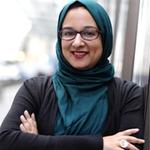The Unique Challenges of 'Being Black on Both Sides'
Community
|
Feb 19, 2021
|
3 MIN READ

Image source: Umm Juwariyah
Being Black in America (or in many parts of the world) has always come with its challenges. But to have that amplified in Muslim spaces with anti-Blackness from Muslims who are not informed and inclusive of the various ways of being “Islamic” outside of South Asian and Middle Eastern lenses compounds those challenges.
This is what means to be “Black on Both Sides,” the theme of the third annual Black Muslim Author’s conference this month, says conference organizer and author Umm Juwariyah. “Black people will often experience racism in multiple ways. Black Muslims will often experience being Black on both sides with their co-religionists who are unfamiliar or woefully ignorant on how to treat and embrace Black Muslims and Black Muslim culture.”
All this month Black Muslim authors are gathering in online forums to discuss the unique issues and share stories and lessons on what helps in various aspects of storytelling, authorship and writing. Along with Umm Juwayriyah (Maryam A. Sullivan), Haute Hijab’s own writer and author of NbA Muslims Layla Abdullah Poulos and Poet Nzima Hutchings along with Muslim Girls Read and Every Kinda Lady have convened nearly 30 authors over vibrant discussions about the “intersections and influence of race and faith on their work.”
Being “Black on both sides” is something Layla feels acutely. “Even among people who shared the Black experience, I received subtle messaging that I needed to shed as much of my African American identity as possible … adopting South Asian and Middle Eastern styles [to be] considered more ‘Islamic.’
“I could not be who I wanted or express myself the way I wanted. If I did, people brandished me with stereotypes like the ‘Angry Black Woman’ to dismiss me,” Layla says.

The conference panelists are discussing this and a myriad of other experiences in the spaces of authorship, whether as novelists, screenwriters, romance writers, nonfiction authors or authors of children’s books, to name a few. Seyna Rytes, the author of Seven Days to Love spoke with Haute Hijab about the tremendous job Black Muslim authors do in telling stories about characters who “resemble us. They relate our issues, struggles and victories. This is an essential task.”
Umm Juwariyah says all of the panels were intentionally created “to display the richness and breadth of ways that Black Muslim authors and writers are helping to create, shape and represent their creativity.” For example, she says Ameenah Muhammad-Diggins in her book Bashirah and the Amazing Bean Pie “reminded us of the importance of … passing down our culture foods to our children” while Nasheed Jaxson, a romance author, writes stories that “chip away at age old stereotypes about Black men and foster understanding about the challenges and joy Black men find as fathers, husbands, sons and brothers.”
While the BMA conference was created as a safe space for Black Muslim authors and community members to discuss and brainstorm about shared experiences in the publishing world, “it is simultaneously a love letter and invitation for those Muslims and non Muslims outside our spaces to learn about us and learn how to build with us as well,” says Umm Juwariyah.
Black Muslim authors are in a unique position to educate and inspire readers about Blackness and Islam, says Layla. “They give us a chance to see ourselves beyond the contrived archetypes of white supremacy outside of Muslim culture and Desi/Arab supremacy among our Muslim brethern, so we can love all of who we are.
“Many Black Muslim authors [also] go places where other Muslim writers fear to tread, being unapologetically Black and Muslim and speaking to their experiences, instead of catering to the white gaze,” says Layla. That is powerful and empowering to ourselves, youth and fellow Muslims.”
Haute Hijab is proud to be a sponsor of the Black Muslim Authors conference along with @AbtIslamNet @MuslimARC, @hearttogrow and @DayBreakPress.
Subscribe to be the first to know about new product releases, styling ideas and more.
What products are you interested in?

